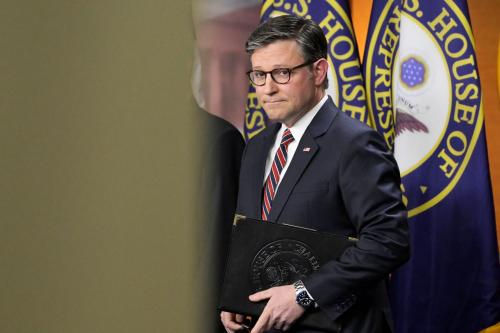Economic mobility and opportunity were the themes of the day for President Barack Obama’s fifth State of the Union Speech. Invoking the middle class and smarter tax policies, the president offered a significant number of policy pearls which many of my Brookings colleagues will expand upon. I want to highlight one of his major policy goals: raising the minimum wage.
Raising the minimum wage is deeply personal to me—my parents came to this country and were excited to earn a minimum wage. I eventually found my way to working for Senator Kennedy within months of him delivering a passionate floor speech on the minimum wage over six years ago.
The minimum wage has not kept pace with inflation and the rate of growth of other consumer prices, thus creating the disparity that exists:
1950 minimum wage: $0.75/hour
Gallon of gas: $0.27
Movie Ticket: $0.50
1970 minimum wage: $1.60/hour
Gallon of Gas: $0.36
Movie Ticket: $1.55
1990 minimum wage: $3.80/hour
Gallon of Gas: $1.13
Movie Ticket: $4.25
2014 minimum wage: $7.25/hour
Gallon of Gas: $ 3.20
Movie Ticket: $10.50
Now these numbers may not mean much, but here is even more context: even though the housing crash may have made rents more affordable in some parts of the country, many people working full time jobs at minimum wage still can’t afford rent and have enough money to buy groceries much less have anything saved for their family, children, etc.
The president’s executive order to increase the minimum wage for federal workers to $10.10 an hour has received some criticism already since it won’t be uniform in its effect and doesn’t change national policy, but it does have the potential to affect up to 250,000 federal workers and contractors who currently make below $10.10 an hour. And given the stalemate in Congress, it might be the only way to make such a change before the end of Obama’s time in office.
Since I am a physician, adding a healthcare context to all of this is even more important—even with health insurance, a copayment for a doctor’s visit can be as high as $40, or approximately 5.52 hours of work at a minimum wage. Add to that copayments for drugs, hospital stays, emergency room visits, and even if you don’t hit the annual limits for out of pocket spending recently put in place by the Affordable Care Act, you can still find yourself destitute and robbed of any chance at economic mobility.
What the president’s speech teaches us is how intimately connected wage earnings are to every aspect of our lives: health, education, aging and more. As the president’s policy change looms in the shadows of another deficit/debt ceiling negotiation and unemployment insurance extension, I hope that we can find another magical moment much like what we witnessed tonight with Army Ranger Cory Remsburg when sustained applause was for just one moment able to overcome the partisan cynicism of our nation.
The Brookings Institution is committed to quality, independence, and impact.
We are supported by a diverse array of funders. In line with our values and policies, each Brookings publication represents the sole views of its author(s).



Commentary
What $7.25 Will Get You in 2014: Reflecting on the Minimum Wage and the State of the Union
January 28, 2014